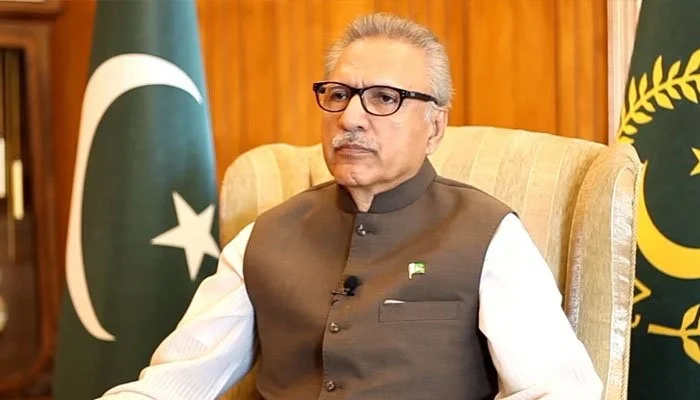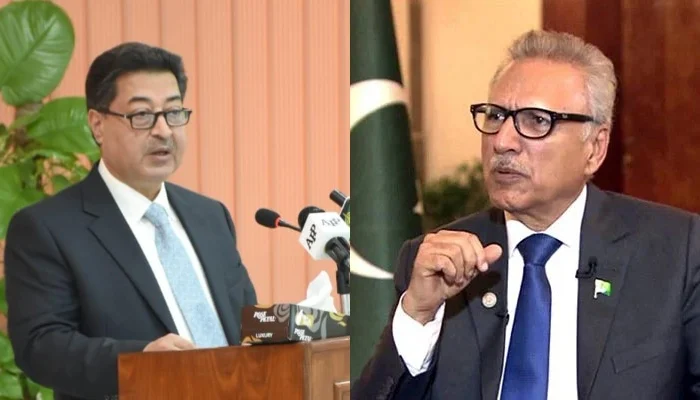
President Dr. Arif Alvi suggests 6th November date for the holding of polls in a letter to CEC Dr. Sikandar Sultan Raja
President Dr. Arif Alvi said that the National Assembly was dissolved by him on the advice of the then-prime minister Shehbaz Sharif on August 9, 2023.
Conduct of general elections & announcement of elections date is the sole competence of ECP: Federal & provincial law ministers
“The Election Commission of Pakistan is an independent constitutional body,” the statement, issued by the ministry, read.
ISLAMABAD ( Web News )
In a new development to the ongoing controversy around the timing of general elections, President Dr. Arif Alvi on Wednesday suggested a date for the holding of polls in a letter to the Chief Election Commissioner (CEC) Dr. Sikandar Sultan Raja.
The president said that in the light of Article 48(5) of the Constitution, he has the authority and mandate “to appoint a date not later than 90 days from the date of dissolution [of assemblies], for holding of a general election to the assembly.”
President Dr. Arif Alvi said that the National Assembly was dissolved by him on the advice of the then-prime minister Shehbaz Sharif on August 9, 2023.
[…] in terms of Article 48(5) the general election to the National Assembly should be held by the eighty-ninth day of the date of dissolution of the National Assembly, i.e. Monday 6th Day of November 2023,” the letter stated.
It also read that in a bid to fulfill the constitutional obligations, the president invited CEC Dr. Sikander Sultan Raja for a meeting to devise the modalities of implementing the constitutional intent and mandate for appointing a date, but the latter took a “contrary view” that it was the Election Commission of Pakistan’s domain under the Constitution and framework of electoral laws.
Moreover, the CEC maintained that after the publication of Census 2023 on August 7, the duly notified delimitation of constituencies was in progress as required by Article 51(5) and section 17 of the Elections Act, 2017, the letter added.
It further stated that the Ministry of Law and Justice, all provincial governments also voiced the same opinion.
Furthermore, President Dr. Arif Alvi also called for the general elections to the lower house of parliament and all provincial assemblies to be conducted on the same date.
He said that the federal law ministry was also of a similar view as that of the ECP chief, adding that all four provincial governments are of the view that the announcement of the election date is mandate of the ECP.
“There is a consensus that to strengthen the federation and to promote unity and harmony amongst provinces and to avoid incurring of unnecessary expenses, general elections to the National Assembly and the provincial assemblies must be held on same day,” he added.
The president said that it was the responsibility of the ECP to abide by all the constitutional and legal steps stipulated under Articles 51, 218, 219, 220 and the Elections Act, 2017 for organising and conducting free and fair elections.
“Taking into account all the above, the Election Commission of Pakistan in consultation with provincial governments and political parties under the relevant provisions of the Constitution and in view that some of these matters are already subjudice, may seek guidance from the superior judiciary for announcement of a single date for general election to the national and provincial assemblies,” he concluded.
Earlier on Wednesday, federal and provincial law ministers unanimously urged all organs of the state to respect the autonomy and authority of the Election Commission of Pakistan (ECP) in carrying out the delimitation of constituencies and determining the election schedule.
This statement by the law ministers was conveyed via an official statement following a meeting chaired by caretaker Law and Justice Minister Ahmad Irfan Aslam in Islamabad.
The meeting — attended by provincial law ministers Kanwar Dilshad (Punjab), Muhammad Omer Soomro (Sindh), Arshad Hussain Shah (Khyber Pakhtunkhwa) and Amanullah Kanrani (Balochistan) — was held to discuss matters pertaining to the upcoming general elections to the National and provincial assemblies.
It concluded after the huddle determined that the conduct of general elections and announcement of election dates is the sole competence of the country’s electoral authority, as per the Constitution.
“The Election Commission of Pakistan is an independent constitutional body,” the statement, issued by the ministry, read.
The Pakistan Muslim League-Nawaz-led (PML-N) coalition government dissolved the National Assembly on August 9 while the Sindh and Balochistan assemblies were also prematurely dissolved to allow the electoral authority to hold elections in the country within 90 days instead of 60 days if the legislature completed its constitutional tenure.
If the elections are to be held within the 90-day limit, then the polls are due on November 9, 2023.
However, before dissolving the assemblies the coalition government in a Council of Common Interest (CCI) meeting had unanimously approved the 7th Population and Housing Census 2023.
According to Article 51 (5) of the Constitution, the seats of the National Assembly to each province and the federal capital shall be allocated on the basis of population as per the new census.
Following CCI’s approval, the ECP on August 17 announced the schedule of new delimitations which exceeded the November 9th 90-day constitutional limit, almost making sure that the elections are likely to be held post the 90-day mark.
As per the schedule announced by the ECP:
September 8 to October 7 — Delimitation of the constituencies to be held across the country.
October 10 to November 8 — Proposals regarding constituencies to be submitted.
September 5 to September 7 — A quota of constituencies of the national and provincial assemblies to be allocated.
August 21 — Constituency committees of four provinces to be established.
August 31 — Administrative matters related to the constituencies to be completed.
November 10 to December 9 — ECP to decide on the objections to the constituencies.
December 14 — Final publication of the delimitation.
Federal & provincial law ministers
Minister for Law and Justice, Ahmad Irfan Aslam convened a meeting with Provincial Law Ministers, Kanwar Muhammad Dilshad (Punjab), Muhammad Omer Soomro (Sindh), Arshad Hussain Shah (Khyber Pakhtunkhwa) and Amanullah Kanrani (Balochistan), to discuss matters pertaining to the upcoming general elections to the National and Provincial Assemblies.
During the meeting, all Law Ministers underscored the importance of upholding the principles of democracy and ensuring smooth conduct of elections. It was unanimously agreed that the Constitution must be read as a whole and no provision of the constitution must be read in isolation of other relevant provisions. As per the Constitution, the conduct of general elections and announcement of elections date is the sole competence of the Election Commission of Pakistan.
The Provincial Law Ministers emphasized that in order to strengthen the Federation, to ensure harmony amongst all federating units and to avoid unnecessary financial burden on the national exchequer incurred owing to provision of security arrangements on different election dates, the general elections to the National and the four Provincial Assemblies must be held on same day.
The Election Commission of Pakistan is as an independent constitutional body. It is the responsibility of all organs of the State to respect autonomy of the Election Commission and its authority in carrying out delimitation of constituencies and determining the election schedule.
The discussion highlighted the government’s commitment to ensuring free, fair, and transparent elections in Pakistan, adhering to the principles of democratic governance. The Federal and Provincial Governments remains dedicated in promoting a democratic and inclusive electoral environment.

